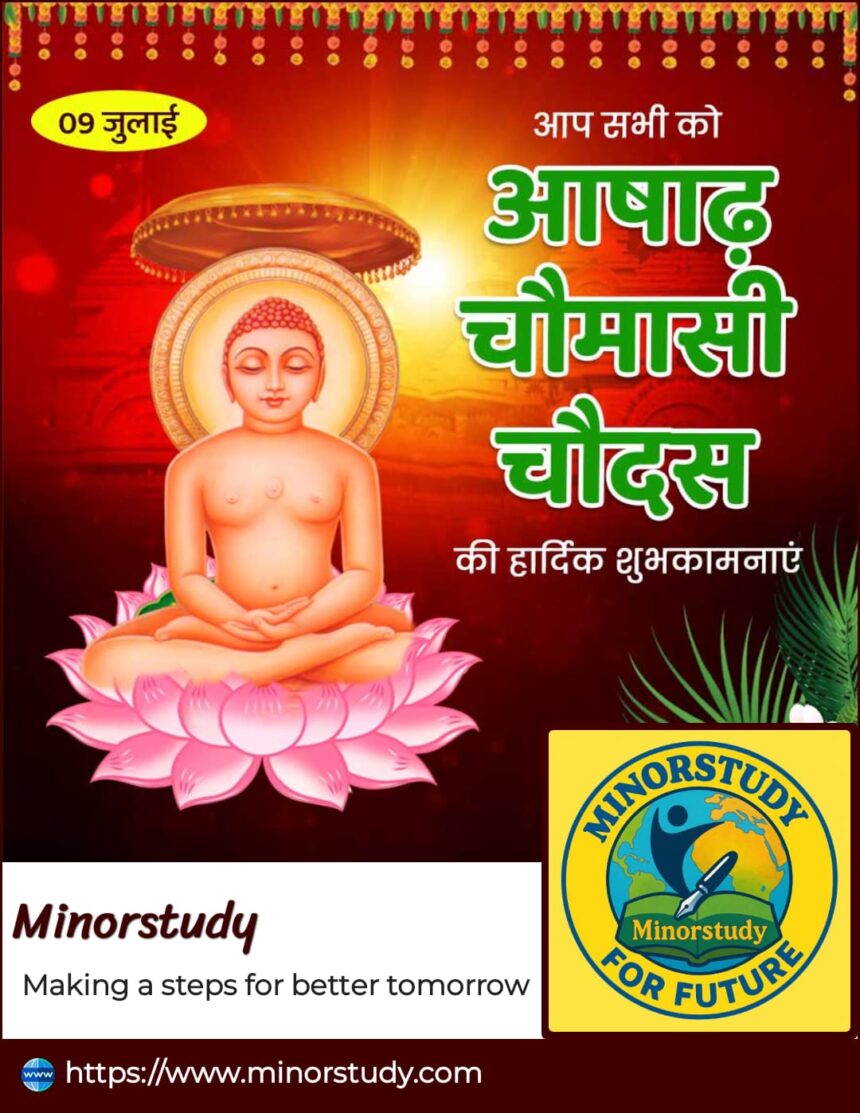🌿 Introduction: The Sacred Ashadha and Its Hidden Fasting Mystery
In the heart of India’s spiritual calendar lies a lesser-known but deeply significant observance—Ashadha Chaumasi Chaudas. Unlike widely celebrated festivals like Diwali or Holi, this sacred day is more internal, reflective, and emotionally charged. It falls during the monsoon month of Ashadha (June–July) and is especially revered in Jainism, but carries deep ethical and spiritual resonance even for broader Sanatan and Dharmic followers.
- 🌿 Introduction: The Sacred Ashadha and Its Hidden Fasting Mystery
- 📜 History of Ashadha Chaumasi Chaudas
- 📅 Timeline and Calendar Placement
- 🪔 Significance of Ashadha Chaumasi Chaudas
- 1. Spiritual Cleansing and Inner Awakening
- 2. Non-Violence (Ahimsa) in Practice
- 3. Vows of Restraint (Vrata)
- 4. Forgiveness and Humility
- 5. Cultural and Ethical Reset
- 📖 Rituals and Observance
- 🔍 Interesting Facts About Ashadha Chaumasi Chaudas
- 🙋 FAQs About Ashadha Chaumasi Chaudas
- 🔹 Q1: Who primarily observes Ashadha Chaumasi Chaudas?
- 🔹 Q2: What should one not do on this day?
- 🔹 Q3: What is the difference between Pakkhi Chaudas and Chaumasi Chaudas?
- 🔹 Q4: Can laypeople participate or is it only for monks?
- 🔹 Q5: Why is boiled water significant?
- 🎯 Importance in Daily Life
- 🎉 Wishing on Ashadha Chaumasi Chaudas
- 📌 7 Important Takeaways
- 🧘♀️ Conclusion: A Day That Transforms, Quietly
Rooted in the practice of introspection, non-violence, penance, and soul-purification, Ashadha Chaumasi Chaudas offers a unique spiritual milestone within the Chaturmas period, a four-month span marked by heightened devotion.
Let us now journey into its history, rituals, relevance, and how it continues to shape our daily lives and societal values.
📜 History of Ashadha Chaumasi Chaudas
The word “Chaumasi” means “quarter-yearly,” and “Chaudas” denotes the 14th day (Chaturdashi) of the lunar month. Ashadha Chaumasi Chaudas thus refers to the 14th day of the Ashadha month, typically observed in the dark fortnight (Krishna Paksha).
In Jain tradition, Chaumasi Chaudas is a day dedicated to introspection (Samayik), forgiveness (Kshamapana), penance (Tapasya), and scriptural listening (Swadhyay). It is said that during this time, monks stay in one place due to the rains and practice rigorous austerities. This period is believed to date back to the times of Tirthankaras, who recommended this cycle for deeper spiritual discipline.
Over the centuries, this tradition has transformed from a monastic observance to a household spiritual renewal day for laypeople as well.
📅 Timeline and Calendar Placement
Month: Ashadha (June–July)
Tithi: Chaturdashi (14th lunar day)
Paksha: Krishna Paksha (waning phase)
Cycle: Recurs every four months (Chaumasi = quarterly)
In 2025: It is expected to fall on Friday, July 11, 2025
Ashadha Chaumasi Chaudas is one of the four Chaumasi Chaudas days in a year—observed in Ashadha, Kartik, Falgun, and Magh.
🪔 Significance of Ashadha Chaumasi Chaudas
1. Spiritual Cleansing and Inner Awakening
This day is all about cleaning the soul’s mirror. Just like nature rejuvenates during the rains, Ashadha Chaumasi Chaudas allows one to pause, reflect, and purify the self from anger, ego, greed, and attachments.
2. Non-Violence (Ahimsa) in Practice
During this season, many insects are born due to rains. Monks and laypeople alike minimize travel and cooking, eat satvik and boiled food, and abstain from any activities that may unintentionally harm life.
3. Vows of Restraint (Vrata)
It is common for devotees to take special vows, like fasting, silence (maun), reading scriptures (agams), and staying away from digital and material distractions.
4. Forgiveness and Humility
People seek forgiveness from all living beings, a ritual beautifully encapsulated in the phrase “Micchami Dukkadam”—meaning, “May all the harm I’ve done knowingly or unknowingly be forgiven.”
5. Cultural and Ethical Reset
Ashadha Chaumasi Chaudas is a societal checkpoint. It reminds us to reassess our behaviors, reset our ethics, and reconnect with community well-being.
📖 Rituals and Observance
Penance and Fasting (Upvas): Many devotees perform complete or partial fasts. Some drink only boiled water.
Scriptural Study (Swadhyay): Listening or reading scriptures, especially Jain Agamas.
Introspection and Meditation (Samayik): Practicing silence and inner observation.
Forgiveness Prayer (Pratikraman): A ritual of repentance and forgiveness.
Minimalism and Non-violence: Avoiding harm to even the smallest insects by minimizing outdoor activities.
Seva (Service): Offering food and support to monks, nuns, and needy beings.
🔍 Interesting Facts About Ashadha Chaumasi Chaudas
🔸 It marks the beginning of Chaturmas, the 4-month spiritual season.
🔸 Many Jain monks halt their wanderings and stay in one location during this time.
🔸 Non-Jain followers also observe fasting and ethical conduct inspired by these traditions.
🔸 The Ashadhi Chaumasi is considered the most spiritually intense among the four.
🔸 It is a quiet festival—celebrated not with lights or noise, but with peace, penance, and compassion.
🙋 FAQs About Ashadha Chaumasi Chaudas
🔹 Q1: Who primarily observes Ashadha Chaumasi Chaudas?
A: Primarily observed by Jain communities, but others interested in spiritual practices, non-violence, and fasting also follow it.
🔹 Q2: What should one not do on this day?
A: Avoid unnecessary travel, spicy or raw food, violence in speech or action, and indulgence in luxuries.
🔹 Q3: What is the difference between Pakkhi Chaudas and Chaumasi Chaudas?
A: Pakkhi Chaudas occurs twice a month (every Chaturdashi), while Chaumasi Chaudas is a major observance every three months—four times a year.
🔹 Q4: Can laypeople participate or is it only for monks?
A: Laypeople are highly encouraged to participate through fasting, charity, silence, and spiritual reading.
🔹 Q5: Why is boiled water significant?
A: It ensures no microorganisms are killed while drinking, aligning with the Ahimsa principle.
🎯 Importance in Daily Life
✅ Ethical Living
Ashadha Chaumasi Chaudas inspires truthfulness, contentment, humility, and simplicity—qualities that improve personal and professional lives.
✅ Reducing Mental Clutter
With silent reflection and mindfulness practices, we reduce anxiety, stress, and emotional toxins.
✅ Environmental Awareness
By restricting cooking, travel, and material usage, it promotes eco-friendly living—ideal for today’s climate crisis.
✅ Social Unity
The day brings communities together in non-competitive, peaceful harmony—strengthening collective values.
🎉 Wishing on Ashadha Chaumasi Chaudas
Here are some heartwarming wishes you can share:
🌸 “May the spirit of Ashadha Chaumasi Chaudas purify your heart and fill your life with peace and compassion. Micchami Dukkadam!”
🌿 “On this sacred day, may your soul be lightened from all burdens and your path guided by truth and humility.”
🌺 “Wishing you inner strength, spiritual clarity, and eternal peace on Ashadha Chaumasi Chaudas.”
📌 7 Important Takeaways
A day of spiritual cleansing and self-purification.
Core values include Ahimsa, forgiveness, and restraint.
Aligned with environmental sustainability.
Observed through fasting, silence, and scripture reading.
Reinforces ethical and moral accountability.
Encourages interpersonal peace and social harmony.
Offers a quiet revolution of the self, every quarter.
🧘♀️ Conclusion: A Day That Transforms, Quietly
In a noisy world obsessed with celebrations that glitter, Ashadha Chaumasi Chaudas stands apart. It doesn’t come with fireworks or lavish processions. Instead, it demands a still mind, a kind heart, and a disciplined life.
In daily life, it reminds us that true power lies in restraint, real celebration is in forgiveness, and growth begins with silence.
Let us all take a moment this Ashadha Chaumasi Chaudas not only to pause and reflect, but to truly reset our inner compass.








